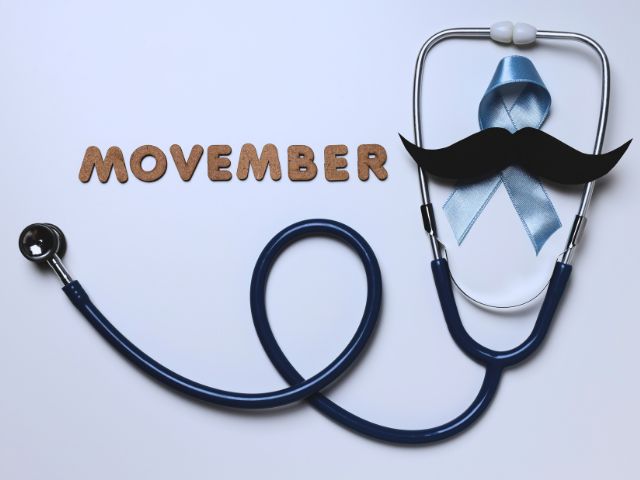Events | Holidays & Freebies National Nurses Week: Honoring Our Favorite Pop Culture Practitioners National Nurses Week runs from May 6-12, and includes a variety of ways to honor nurses. This year’s theme is “Nurses Make the Difference.” As part...


MSN-Ed, BSN, RN
Have you noticed men growing mustaches during November?
The Movember Foundation – a global movement in support of men – designated the month of November (or “Movember”) as a time to focus on improving the lives of men. During this month, many men around the world grow a mustache to spark conversation and bring awareness to the physical and mental health problems men face.
Now is the perfect time to give focus to the mental health crisis among men in the U.S. today. Studies show that women seek help for their mental health more than men. Women go to counseling, receive therapy, and take prescribed medications for mental illness.
Most men, however, do not seek mental health care and treatment.
This article will address the severity of the mental health crisis among men, the reasons why many men do not seek care, and how nurses can help to alleviate the problem.

In the U.S., 6 million men are affected by depression each year. Over 3 million men have a panic disorder or phobia. Of the 90% of people diagnosed with schizophrenia by age 30, 90% are men. Of the people with binge-eating disorders, over 35% are men.
Mental illness if left untreated can have devastating effects on the sufferer. Suicide rates among men are significantly higher than those among women – four times higher.
Mental illnesses, especially mental illnesses with “serious functional impairment, which substantially interferes with or limits one or more major life activities” may be more prevalent among women. Yet suicide rates are highest among men. Lack of treatment may be the culprit, as studies show that women seek care for their mental illness more often than men.
One survey revealed that women were more likely than men to receive treatment for their mental health conditions, including both therapy/counseling from a mental health professional and medications. This statistic is particularly alarming as it highlights a greater problem.
Many men refuse to seek mental health care in the first place, but of the ones who do receive a diagnosis, most refuse to seek treatment for it.
According to Mental Health America, men do not seek help for depression, substance abuse, or stressful life events due to reluctance to speak, downplaying symptoms, and social norms. Masculinity likely plays a role.
In the American Journal of Men’s Health, author Benita N. Chatmon, PhD, MSN, RN, CNE explained that American men are affected by standards of masculinity that are “literally killing them.” Chatmon suggested that the pressure of adhering to masculine norms – which define what manhood is in a given culture – may be the reason many men are suffering in silence.
For example, expressing emotions and admitting to a mental illness may be considered “weak.”
This explanation may not be far-fetched. In Psychology Today, professional counselor Dan Bates, LMHC, LPCC, NCC pointed out that men’s desire to be “Superman” is their Kryptonite. “We are killing ourselves,” Bates advised men to consider that admitting a problem is actually a sign of strength, not weakness.
It is important to acknowledge the men who may consider seeking help, but other barriers play a role. One survey found that 42% of people who couldn’t access mental health treatment were unable to do so due to cost.
Mental illness in general is a topic that is still very much stigmatized. Could it be that mental illnesses among men are even more stigmatizing than those among women? The Movember Foundation is trying to change that.
Postpartum depression is a mental health disorder that occurs in those who have recently given birth. Symptoms can include suicidal and homicidal thoughts. The number one cause of maternal death in the U.S. is mental health disorders, including deaths to suicide and substance abuse disorder (overdose/poisoning). Measures have been taken to address the postpartum depression issue in the U.S.
However, suicide is one of the top ten leading causes of death among men, but not women. Although rising maternal deaths in the U.S. is a serious problem, suicide in men is a serious problem as well. Yet the topic does not receive as much publicity.
Health professionals may be a part of the problem. One report discussed how health professionals are less likely to diagnose mental illness in men or act upon the diagnosis.
The report also highlighted the dismissive/intolerant attitudes of health professionals to suicidal men’s decisions to use drugs, alcohol, and sex to help with their mental illness. When men’s mental health is taken lightly or avoided altogether, both men and society may suffer.

The mental health crisis among men is more than a medical issue – it’s a public safety concern. Studies suggest that men “act out” in response to inner turmoil, whereas women tend to “act in.” This “acting out” can lead to dangerous risk-taking behavior, poor impulse control, and increased anger.
The Psychology Today article explained the negative consequences of men not addressing their mental health. “Our choices affect others. Who pays the bill for our unmanaged medical issues? Who takes care of us or picks up the slack when we are at the hospital, or bed-bound? Who suffers from our acting out with food, smoking, and alcohol? Our partners, kids, co-workers, friends, and community members — the people who depend on us,” Bates wrote.
Solving this problem involves more than individualized education. In the American Journal of Men’s Health article, societal-level changes and a redefinition of ‘manhood’ is recommended. “There must be transformation in changing the American culture in which males are more comfortable expressing themselves,” Chatmon wrote.
Nurses can contribute to the health and safety of men by first, addressing their feelings and potential biases about mental illness in men. Nurses should educate themselves on how mental illness can develop and present differently in men.
Nurses should then learn to recognize the signs, identify risk factors, educate the public, and bring awareness to the problem. Doing so may help to alleviate the associated stigma and help men lead healthier and more productive lives.
Men are more likely to report irritability, fatigue, and loss of interest in work or hobbies, as opposed to feelings of sadness. Nurses should look for these changes along with other signs and symptoms which may include:
There are over 200 types of mental illnesses. Nurses can help by paying attention to factors associated with mental illness in the general population as well as those that affect men in particular.
Risk factors for mental illness in the general population:
Risk factors for mental illness in men specifically:
Nurses should advocate for men by educating the community on the signs and symptoms of mental illness in men. While it’s impossible to force men to seek help, some men may be unaware that the changes they are experiencing in their lives could be associated with a mental illness.
Educating the public is also an indirect way of reaching many men as studies suggest that men are most comfortable speaking about their struggles with those in their closest circle, like family and friends.
Nurses can do their part by bringing awareness through community discussions like podcasts, videos, and small talk. Nurses can write about the problem (via blogs, social media posts, and other public platforms) or share information that they have read (for example, sharing this post on social media).
Nurses can also help by encouraging men who are open about their illness and receiving treatment to speak up and bring awareness to other men in their communities. This may help men to feel safe enough to acknowledge that they also have a problem and ask for help.
Bringing awareness may even help to recruit more men to join the mental health workforce as counselors, social workers, and psychologists.

Mental illness is a significant problem that is silently destroying the lives of many men in this country, but organizations like the Movember Foundation are trying to help. When men suffer in silence, things will only worsen over time.
It is time for nurses to speak up and advocate for men’s mental health. When this public health crisis is addressed, men have the potential to be healthier for themselves and their families/communities.
When more people start to realize the extent of the problem, men’s mental health may be a topic that is taken more seriously.
Nurses can assess their attitudes and knowledge surrounding mental illness by taking this Mental Health Quiz by the Centers for Disease Control and Prevention (CDC). Nurses can also share this quiz with others to bring awareness.
[For suicide resources and crisis support, call the Suicide Hotline by simply dialing or texting 988.]
Love what you read?
Share our insider knowledge and tips!
Read More

Events | Holidays & Freebies National Nurses Week: Honoring Our Favorite Pop Culture Practitioners National Nurses Week runs from May 6-12, and includes a variety of ways to honor nurses. This year’s theme is “Nurses Make the Difference.” As part...

Events National Cancer Prevention Month February is National Cancer Prevention Month 2024! Nurses can be an educational resource for patients on how to protect themselves. Cancer prevention can look like lifestyle changes to minimize modifiable risk factors and...

Events International Prenatal Infection Prevention Month 2024 February is International Prenatal Infection Prevention Month 2024! Learn about a nurse’s role in educating patients on how to protect themselves. Common prenatal infections you can explore with...